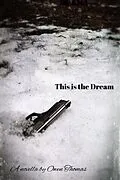Cali Watts is struggling to come of age in a life saturated with indifference. Stealing almost worthless things isn't helping. Neither is dreaming of the dead."e,Take me where you took her,"e, I said. "e,That's where I want to go."e,Her parents named her Calico Watts, a name she hates as much as she does the rest of her life. Growing up a child of divorce in Weldon Spring, Missouri has left Cali numb, without identity or purpose, sapped of any ambition for the future and even for the one thing all teenagers crave: freedom.Cali's mother, Karen, is not lacking ambition, but it's all toxic. An HR specialist during working hours, Karen devotes nearly every other waking hour to the level-climbing and recruit-mongering requirements of a beauty products pyramid scheme called Dream Life, carpet-bombing Cali's existence with unhelpful aphorisms like If you can dream it, you can be it and Share the dream to live the dream.Cali's father, a municipal accountant by trade, has, post-divorce, found a way to devalue freedom by devolving into a pothead who pays more attention to his secret grow operation and his sex life than his withering career and his own children. Cali's younger brother, Benji, has weathered the divorce in a cloud of obliviousness, spending his days in his room wearing a headset and gripping a controller, killing zombies and other threats to civilized society in shockingly realistic, first-person-shooter video games. Cali's only school friend, Stacey, has discovered that her own physical attributes are good for some attention from others more worthy than Cali, including a couple of cool girls previously thought to be out of reach and, significantly, the Howell High School science teacher. Feeling for Cali, the act of caring about anything, has become a challenge. Stealing nearly worthless things from the Ninety-Nine Cent Store has not helped. Fear of failing out of school no longer holds the same current. Alienation and estrangement have become weather. Only two people have made enough of an impression on Cali to punch through the numbness that is slowing overtaking her existence. The first is Taylor Boss, easily the most attractive, well-liked student of Howell High. Taylor, whose popularity among the student body and the faculty had confined her to wholly unrelatable orbits, never had any relevance or interest to Cali. At least, not until Taylor was found naked and shot to death in an old duck shack along the banks of the Mississippi. In death, Cali has found a strange and unsettling kinship with Taylor, encountering her night after night in bizarre, portentous dreams. The second person in Cali's life who has managed to move the needle is Damien Alvarez, the Howell High safety officer who has a habit of catching Cali's eye every time they pass each other in the crowded hall. It may or may not be flirting, Damien's looks are too subtle to tell, but it is certainly attention. Damien sees her. That matters. It also matters that Damien was the last person to see Taylor Boss alive. This is the Dream is a novella. While it is available for purchase separately, This is the Dream is also included as the title novella in a larger work of short fiction of the same name - This is the Dream - by Owen Thomas.
Autorentext
Owen Thomas is a life-long Alaskan living on Maui because life is too short for long winters. He has written six books: "The Lion Trees" (which has garnered over sixteen international book awards, including the American Writing Awards, the Amazon Kindle Book Award, the Eric Hoffer Book Award, the Book and Author Book of the Year, the Beverly Hills International Book Award and, most recently, a finalist in the Book Excellence Awards); "Mother Blues," (a novel of music and mystery set in post-Hurricane Harvey Texas, Finalist for the American Writing Awards and the Book Excellence Fiction Award, and collecting a Bronze in the Readers Views Reviewers' Choice Awards); "Message in a Bullet: A Raymond Mackey Mystery," (the first in a series of detective novels, shortlisted for the Best Mystery Book of the Year by Forward INDIES Book of the Year Awards and collecting a Silver from the eLit Book Awards); "The Russian Doll: A Raymond Mackey Mystery" (the second book in that series); "Signs of Passing" (a book of interconnected short stories and novellas, and winner of fourteen book awards, including the 2014 Pacific Book Awards for Short Fiction, the Indie Reader Discovery Award, the Great Southwest Book Festival, has garnered placements at the Paris, London and Los Angeles Book Festivals and was also named one of the 100 Most Notable Books of 2015 by Shelf Unbound Magazine); and "This is the Dream," (a collection of stories and novellas that explore that perplexing liminal distance between who we are and what we want; Finalist for the American Writing Awards and the International Book Award in short fiction, and collecting a Bronze in the Readers Views Reviewers' Choice Awards). Owen maintains an active fiction and photography blog on Facebook, Tumblr and on his author website at www.owenthomasliterary.com.
For the ninth consecutive year since he has been measuring his commercial success as an author, Owen has not won the Orange Prize for Fiction. Also, to great acclaim, he has not won the Man Booker Prize. Most recently, in April of 2020, Owen was not nominated for a Pulitzer.
Owen makes his home in Alaska and Maui, Hawaii. When he is not writing, Owen can be found recreating and taking photographs in the grandeur of these wonderfully picturesque locations. Some of these photos are posted on Owen's photo blog, 1000 Words per Frame.
